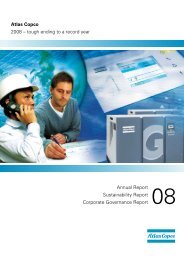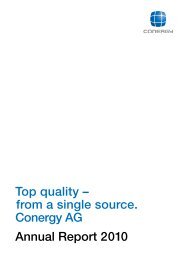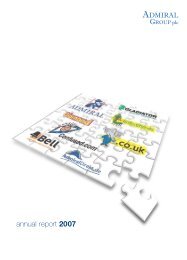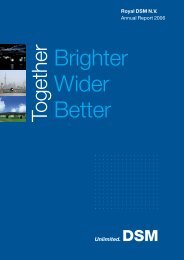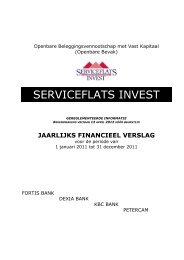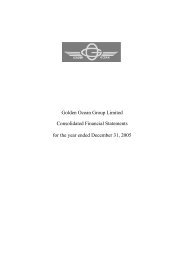BOC Report and accounts 2005 - Alle jaarverslagen
BOC Report and accounts 2005 - Alle jaarverslagen
BOC Report and accounts 2005 - Alle jaarverslagen
You also want an ePaper? Increase the reach of your titles
YUMPU automatically turns print PDFs into web optimized ePapers that Google loves.
60 The <strong>BOC</strong> Group plc Annual report <strong>and</strong> <strong>accounts</strong> <strong>2005</strong> Financial review<br />
Inflation<br />
Over the last three years, inflation has not had a material impact on the revenue or profit of the Group.<br />
Critical accounting policies<br />
The principal accounting policies affecting the results of operations <strong>and</strong> financial condition are set out on pages 91<br />
<strong>and</strong> 92 of the financial statements.The application of certain of these policies requires assumptions or subjective<br />
judgements by management. Management bases these on a combination of past experience <strong>and</strong> any other<br />
evidence that is relevant to the particular circumstances.<br />
The application of these assumptions <strong>and</strong> judgements affects the reported amounts of profit during the year<br />
<strong>and</strong> the assets <strong>and</strong> liabilities at the balance sheet date.Actual results may differ from the estimates calculated using<br />
these assumptions <strong>and</strong> judgements. Management believes that the following are the critical policies where the<br />
assumptions <strong>and</strong> judgements made could have a significant impact on the consolidated financial statements.<br />
Tangible fixed assets A significant part of the capital employed of the Group, particularly in the Process Gas<br />
Solutions <strong>and</strong> Industrial <strong>and</strong> Special Products lines of business, is invested in tangible fixed assets.The nature of the<br />
business dem<strong>and</strong>s significant capital investment to renew or increase production capacity or to enable the business<br />
to achieve greater productivity <strong>and</strong> efficiency.<br />
It is the Group’s policy to depreciate tangible fixed assets, except l<strong>and</strong>, on a straight line basis over the effective<br />
lives of the assets.This ensures that there is an appropriate matching of the revenue earned with the capital costs of<br />
production <strong>and</strong> delivery of goods <strong>and</strong> services.A key element of this policy is the estimate of the effective life<br />
applied to each category of fixed assets which, in turn, determines the annual depreciation charge. In deciding the<br />
appropriate lives to be applied, management takes into account various factors including, among other things, the<br />
accumulated experience of the effective asset lives from historic business operations <strong>and</strong> an assessment of the likely<br />
impact of any changes in technology.<br />
While Group earnings in any period would fluctuate if different asset lives were applied, in some cases the<br />
original estimated life of an asset is closely related to contractual arrangements with large customers. Some of the<br />
earnings impact of choosing a different asset life would be mitigated, as the different life may reflect different<br />
contractual arrangements with such customers. Nevertheless, variations in the effective lives could impact the<br />
earnings of the business through an increase or decrease in the depreciation charge. It is estimated that a change<br />
of one year in the effective life of all plant, machinery, vehicles <strong>and</strong> cylinders would have an impact of between<br />
£15 million <strong>and</strong> £20 million on annual Group operating profit.A change in the effective life of buildings would have<br />
only a negligible impact.<br />
Intangible fixed assets In a similar manner to tangible fixed assets, management uses its judgement to determine<br />
the extent to which goodwill arising from the acquisition of a business has a value that will benefit the performance<br />
of the Group over future periods. It is the Group’s policy to amortise goodwill on a straight line basis over its useful<br />
economic life.This takes into account, among other things, the maturity of the business acquired <strong>and</strong> its product <strong>and</strong><br />
customer base.Any change in these assumptions would have an impact on the earnings of the Group.<br />
It is estimated that a change of one year in the useful economic life of all goodwill would have an impact of<br />
approximately £1 million on annual Group operating profit.<br />
Retirement benefits Results of the Group include costs relating to the provision of retirement benefits for<br />
employees. It is the directors’ responsibility to set the assumptions used in determining the key elements of the<br />
costs of meeting such future obligations.The assumptions are based on actual historical experience <strong>and</strong> are set after<br />
consultation with the Group’s actuaries.They include the assumptions used for regular service costs <strong>and</strong> for the<br />
financing elements related to the pension schemes’ assets <strong>and</strong> liabilities.Whilst management believes that the<br />
assumptions used are appropriate, a change in the assumptions used would affect both the operating profit <strong>and</strong> net<br />
interest cost of the Group.<br />
There are a number of elements used in the assumptions <strong>and</strong> these vary for the different countries in which<br />
the Group operates.There may also be an inter-dependency between some of the assumptions, making it<br />
potentially misleading to consider any approximate impact on Group results of a change in any one assumption in<br />
isolation. Nevertheless, for the UK <strong>and</strong> US schemes together, it is estimated that an absolute 0.25 per cent change<br />
in the assumptions on rates of inflation, discount rates <strong>and</strong> return on equities in pension scheme assets would<br />
individually result in changes of approximately £6 million, £3 million <strong>and</strong> £3 million respectively in the total pension<br />
cost in annual Group profit before tax.A similar change in the assumptions on all other schemes would have only a<br />
negligible impact.<br />
Environmental provisions In certain parts of the business, mainly in the US, the Group has obligations to carry out<br />
environmental clean-ups at former <strong>and</strong> current production sites. Many of these obligations will not arise for a<br />
number of years, <strong>and</strong> the costs are difficult to predict accurately. Management uses its judgement <strong>and</strong> experience to<br />
provide an appropriate amount for the likely cost of such clean-ups, <strong>and</strong> the amounts, if material, are discounted to<br />
present values. Both the amount of anticipated costs, <strong>and</strong> the interest rates used to discount such costs, are<br />
subjective.The use of different assumptions would impact the earnings of the Group.<br />
It is estimated that a change of one per cent in the interest rate used to discount such costs would have an<br />
impact of approximately £1 million on annual Group profit before tax.




